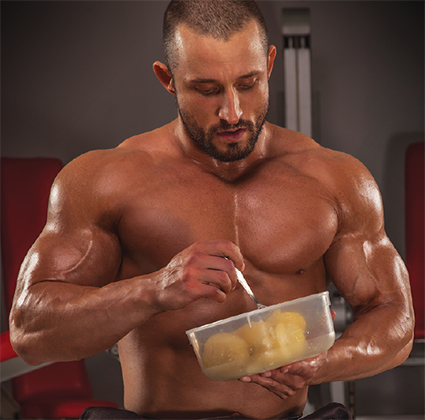The Post-Workout Window: Fact or Fiction?

Squeezing in a carb-and-protein snack immediately after training may be overrated for bodybuilders and strength athletes
For years we’ve been told about the so-called post-workout window, an after-training time frame in which it was critical you consumed protein and carbs or risked leaving gains on the table. (Or, alternatively, you could take in protein or amino acids within the hour or so before training.) Today, our thinking has shifted somewhat on the topic, yet far too many athletes are still approaching the matter as if nothing has changed. Let’s get you caught up with the science.
Although it’s always a smart strategy to have protein shortly after training, what about carbs? And is it necessary to get those carbs in as soon as possible after exercise?
As is common with many such nutrition-related questions, the answer is “it depends.” If you’re a sprinter, hockey, or football player who’s going to do repeated bouts of intense exercise, then you’re well-advised to take in some easily digested carbs right after training or during the activity, and again one to two hours after that. You see, intense exercise can rapidly use up most of the glycogen (stored sugar) in a muscle. In fact, several all-out sprints and most of your glycogen in your legs is gone, and it can take several hours to fully replenish that glycogen. That’s where carb consumption becomes so important. So if you want a “full tank” for the next heat of sprints or for the second half of a game, or you have another game later in the day or early the next, get those carbs in!
On the other hand, if your main goal is lifting weights to increase size and/or strength or to get lean, unless you plan to train the same muscle group within 12 hours, you just have to ensure you’re getting in a few reasonable-sized servings of carbs between bouts. Unless you’re on a low-carb diet, this should give you more than enough glycogen fuel to smash the weights next time you’re in the gym (assuming you’re following a regular training split). In fact, most guys can maintain their level of performance during intense exercise on a diet with only about 200 grams of carbs a day!

So why is there so much information encouraging you to drain a protein-plus-carb shake the moment you finish training? Well, two main reasons. First, it used to be thought that the insulin boost from the carbs increased protein synthesis; however, beyond a very small spike in insulin (a spike that can be achieved even from the paltry insulin-boosting effect of a whey protein shake), any further increase in insulin levels results in no greater effect on protein synthesis. Second, research has shown that a normal diet (that’s high in total carb intake) can be insufficient to replenish glycogen over a 24-hour period in trained endurance athletesdoing exhaustive exercise.
So the first reason has been shown to be based on a flawed assumption (that if a little insulin is good, more is better). The second assumes that it’s beneficial to maximizeglycogen stores to be able to perform a workout that’s sufficient to build muscle and strength, which, broadly, is likely not the case.
Regardless, for those whose goal is to build muscle, their carb and total daily caloric intake should be such that they can maximize glycogen storage; for those who are trying to lose fat, some reduced glycogen storage is inevitable anyhow. Again, in this scenario just get at least 200 grams of carbs daily and your training capacity shouldn’t suffer.
So that’s pretty much it. If you’re a runner or do other competitive sports of long duration or with repeated intense efforts, get your extra carbs in and start taking them after exercise. If your goal is to build muscle, get stronger, or lose body fat, then you don’t have to obsess about maximizingglycogen or replenishing it immediately after training.

